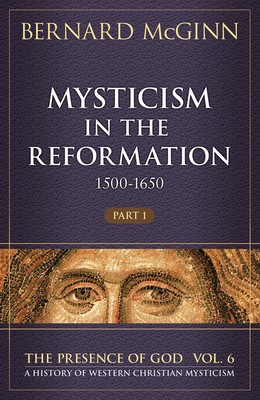
- We will send in 10–14 business days.
- Author: Bernard McGinn
- Publisher: HERDER & HERDER
- ISBN-10: 0824501713
- ISBN-13: 9780824501716
- Format: 15.2 x 23.4 x 2.3 cm, minkšti viršeliai
- Language: English
- SAVE -10% with code: EXTRA
Mysticism in the Reformation (1500-1650), Volume 6 (e-book) (used book) | bookbook.eu
Reviews
Description
Mysticism in the Reformation, Part I of Volume 6 of The Presence of God Series, is the first full account of the role of the mystical element of Christianity in the Reformers who broke with Rome in the period 1500-1650. Although some modern Protestant theologians tried to distance the Reformation from any contact with mysticism, recent scholarship, by both Protestants and Catholics, has shown that Protestant mysticism is an important part of the heritage of the Reformation. After an Introduction surveying modern disputes about the nature of the Reformation and the Catholic reaction to it (both Catholic Reform and Counter-Reformation), Chapter One deals with how the pioneering Reformers Martin Luther and John Calvin reacted to the heritage of Christian mysticism, concentrating on Luther's complicated relation to mystical traditions. Chapter Two turns to the role of mysticism in select Radical Reformers of the sixteenth century, who created models of interior mystical religion that continued to have an effect over the centuries. Chapter Three analyzes the writings of the two most famous Lutheran mystics of the early seventeenth century, Johann Arndt and Jacob Boehme, whose impact in later Western religious traditions has been both powerful and controversial. Finally, Chapter Four considers the significance of mysticism in the English Reformation, both among those who accepted the Elizabethan Settlement that established the Anglican Church, as well as with the dissident Puritans who rejected it.
EXTRA 10 % discount with code: EXTRA
The promotion ends in 22d.22:23:50
The discount code is valid when purchasing from 10 €. Discounts do not stack.
- Author: Bernard McGinn
- Publisher: HERDER & HERDER
- ISBN-10: 0824501713
- ISBN-13: 9780824501716
- Format: 15.2 x 23.4 x 2.3 cm, minkšti viršeliai
- Language: English English
Mysticism in the Reformation, Part I of Volume 6 of The Presence of God Series, is the first full account of the role of the mystical element of Christianity in the Reformers who broke with Rome in the period 1500-1650. Although some modern Protestant theologians tried to distance the Reformation from any contact with mysticism, recent scholarship, by both Protestants and Catholics, has shown that Protestant mysticism is an important part of the heritage of the Reformation. After an Introduction surveying modern disputes about the nature of the Reformation and the Catholic reaction to it (both Catholic Reform and Counter-Reformation), Chapter One deals with how the pioneering Reformers Martin Luther and John Calvin reacted to the heritage of Christian mysticism, concentrating on Luther's complicated relation to mystical traditions. Chapter Two turns to the role of mysticism in select Radical Reformers of the sixteenth century, who created models of interior mystical religion that continued to have an effect over the centuries. Chapter Three analyzes the writings of the two most famous Lutheran mystics of the early seventeenth century, Johann Arndt and Jacob Boehme, whose impact in later Western religious traditions has been both powerful and controversial. Finally, Chapter Four considers the significance of mysticism in the English Reformation, both among those who accepted the Elizabethan Settlement that established the Anglican Church, as well as with the dissident Puritans who rejected it.


Reviews